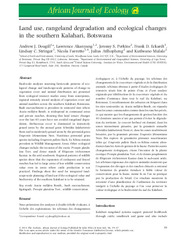| dc.contributor.author | Dougill, Andrew | |
| dc.contributor.author | Akanyang, Lawrence | |
| dc.contributor.author | Perkins, Jeremy | |
| dc.contributor.author | Eckardt, Frank | |
| dc.contributor.author | Stringer, Lindsay | |
| dc.contributor.author | Favretto, Nicola | |
| dc.contributor.author | Atlhopheng, Julius | |
| dc.contributor.author | Mulale, Kutlwano | |
| dc.date.accessioned | 2022-02-17T13:49:13Z | |
| dc.date.available | 2022-02-17T13:49:13Z | |
| dc.date.issued | 2016-02-09 | |
| dc.identifier.citation | Dougill, A. J., Akanyang, L., Perkins, J. S., Eckardt, F. D., Stringer, L. C., Favretto, N., ... & Mulale, K. (2016). Land use, rangeland degradation and ecological changes in the southern Kalahari, Botswana. African Journal of Ecology, 54(1), 59-67. | en_US |
| dc.identifier.issn | 1365-2028 | |
| dc.identifier.uri | https://doi.org/10.1111/aje.12265 | |
| dc.identifier.uri | https://onlinelibrary.wiley.com/doi/full/10.1111/aje.12265 | |
| dc.identifier.uri | https://researchhub.buan.ac.bw:80/handle/13049/357 | |
| dc.description.abstract | Dual-scale analyses assessing farm-scale patterns of ecological change and landscape-scale patterns of change in vegetation cover and animal distribution are presented from ecological transect studies away from waterpoints, regional remotely sensed analysis of vegetation cover and animal numbers across the southern Kalahari, Botswana. Bush encroachment is prevalent in semi-arid sites where Acacia mellifera Benth. is widespread in communal areas and private ranches, showing that land tenure changes over the last 40 years have not avoided rangeland degradation. Herbaceous cover is dominated in intensively grazed areas by the annual grass Schmidtia kalahariensis Stent and in moderately grazed areas by the perennial grass Eragrostis lehmanniana Nees. Nutritious perennial grass species including Eragrostis pallens Hack. Ex Schinz remain prevalent in Wildlife Management Areas. Other ecological changes include the invasion of the exotic Prosopis glandulosa Torr. and dense stands of Rhigozum trichotomum Kuntze. in the arid southwest. Regional patterns of wildlife species show that the expansion of cattleposts and fenced ranches has led to large areas of low wildlife conservation value even in areas where cattle production is not practiced. Findings show the need for integrated landscape-scale planning of land use if the ecological value and biodiversity of the southern Kalahari is to be retained. | en_US |
| dc.language.iso | en | en_US |
| dc.publisher | Wiley Online Library | en_US |
| dc.relation.ispartofseries | African Journal of Ecology;54(1), 59-67 | |
| dc.subject | Acacia melliferaBenth | en_US |
| dc.subject | Bush encroachment | en_US |
| dc.subject | Wildlife conservation | en_US |
| dc.subject | Prosopis glanulosaTorr | en_US |
| dc.subject | Kgalagadi | en_US |
| dc.title | Land use, rangeland degradation and ecological changes in the southern Kalahari, Botswana | en_US |
| dc.type | Article | en_US |

